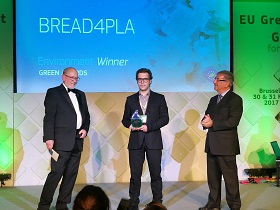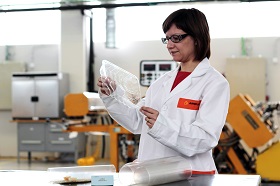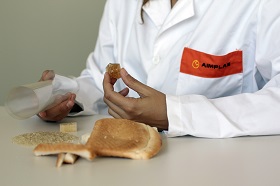 The project LIFE BREAD4PLA, coordinated by AIMPLAS, the Plastics Technology Centre, has been awarded with one of the two Green Awards given by the European Commission in the category of Environment after being selected as one of the best 15 LIFE projects of the last 25 years.
The project LIFE BREAD4PLA, coordinated by AIMPLAS, the Plastics Technology Centre, has been awarded with one of the two Green Awards given by the European Commission in the category of Environment after being selected as one of the best 15 LIFE projects of the last 25 years.
BREAD4PLA is a European project funded by the European Union LIFE+ programme whose objective is the treatment and recovery of wastes from bakery at pilot plant scale to result in new packages to be used in the same sector. Thanks to the fermentation of crusts and wastes from sliced bread and biscuits, polylactic acid (PLA) was obtained to elaborate film for new packages. This material contributes also to reduce the dependence on raw materials of fossil origin and is biodegradable, compostable and allows repackaging in sustainable bags and trays products of the industry.
 The development had the collaboration of companies such as Panrico and Grupo Siro and is especially effective to avoid the rancidity of products like cookies, where a shelf life of up to twelve months has been achieved. Besides, it has allowed to offer a high added-value application to wastes that, hitherto, were used mostly as animal feed.
The development had the collaboration of companies such as Panrico and Grupo Siro and is especially effective to avoid the rancidity of products like cookies, where a shelf life of up to twelve months has been achieved. Besides, it has allowed to offer a high added-value application to wastes that, hitherto, were used mostly as animal feed.
 In the project, other researchers have taken part from the Cereals Technology Centre (CETECE) (Spain), the Leibniz-Institut für Agrartechnik Potsdam-Bornim ATB (Germany) and the Biocomposites Centre of the Bangor University (UK).
In the project, other researchers have taken part from the Cereals Technology Centre (CETECE) (Spain), the Leibniz-Institut für Agrartechnik Potsdam-Bornim ATB (Germany) and the Biocomposites Centre of the Bangor University (UK).
Source
AIMPLAS, press release, 2017-06-12.
Supplier
AIMPLAS (Asociación de Investigación de Materiales Plásticos y Conexas)
Bangor University
CETECE
European Commission
European Union
Leibniz-Institut für Agrartechnik Potsdam-Bornim e.V. (ATB)
Share
Renewable Carbon News – Daily Newsletter
Subscribe to our daily email newsletter – the world's leading newsletter on renewable materials and chemicals









